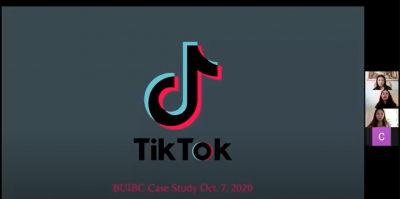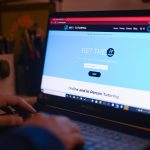TikTok is a Chinese-based social media platform allowing users to make and interact with minute-long videos, such as dances, comedy sketches or vlog-style storytelling.

Created by ByteDance in 2016, the app now has more than 2 billion global downloads and 91 million active monthly users in the United States alone.
Boston University’s International Business Club hosted a “TikTok Case Study” over Zoom Wednesday, during which members examined the platform’s extreme popularity as well as its economic and political implications.
The event was hosted by BUIBC President Alessandra Leone, a junior in the College of Arts and Sciences, and the rest of the organization’s e-board. The club hosts case studies every semester featuring a variety of topics in international business.
To begin the discussion, the executive board explained how TikTok’s software works and explored its connection with U.S. politics, namely the executive order President Trump signed in August that threatened to ban the app due to concerns over possible data collection and ties with the Chinese Communist Party.
Leone said in an interview she and other members felt TikTok is a relevant topic that interests many young people given its presence in politics, and would make for a good case study this semester.
“With all the news about TikTok [and] the ban,” Leone said, “we thought it would be an interesting thing to look at for everyone who’s interested in international business to see what’s happening with that.”
BUIBC Vice President Christine Yao, a junior in the Questrom School of Business, said because the government scrutiny of TikTok affects college students and other members of Generation Z, the topic was likely one their members would already have some familiarity with.
“[The investigation] happened pretty recently, since August of this year,” Yao said in an interview. “Since TikTok is such a popular app among people our age especially, we thought that people would be interested in learning more about how the developments of this event could impact their use on the app as well.”
The presentation was centered around Trump’s deals with TikTok’s parent company and the recent political issues surrounding the app. Trump raised concerns about the app in July after he claimed the Beijing-based company could be operating to spy on Americans.
Last month, Trump closed a deal with ByteDance, claiming the app will become a U.S. company and no longer be involved with China. This company has since hired an American-majority operations team, set up a global headquarters outside of China and now stores user data in the U.S. and backs it up in Singapore.
However, ByteDance still owns 80 percent of the company. Oracle, an American software and technology company owns 12.5 percent and Walmart owns 7.5 percent.
Lylianna Barlette, a senior in Questrom and member of BUIBC, said the biggest problem for the U.S. government is a lack of security laws that would target concerns over China’s data control on TikTok.
“Instead of spending all this money and doing all of these things, then why don’t you just create some laws that restrict data storage, just addressing those concerns,” Barlette said in the Zoom meeting. “At least businesses will have to abide by these certain set of standards in order to operate in these specific countries.”
Despite the U.S. perception of security risks surrounding TikTok, Yao said she thinks TikTok has had a generally positive impact on Gen Z when it comes to destigmatizing taboos and educating peers.
“I think that this app allows users to connect with other users in a more easy way, in a more accessible way,” Yao said. “People are bringing more awareness to certain topics, such as mental health, or just speaking of their own personal experiences as a disabled person, and that could create a lot of educational value to young TikTok users.”
Leone herself uses TikTok almost daily, and said in an interview the app provides a platform for teenagers and young adults to share their views openly.
“For young people, it’s definitely been something positive,” Leone said. “It’s something especially for Gen Z that they needed, because Instagram, it’s become inauthentic, so TikTok’s kind of a way everyone could express themselves.”











